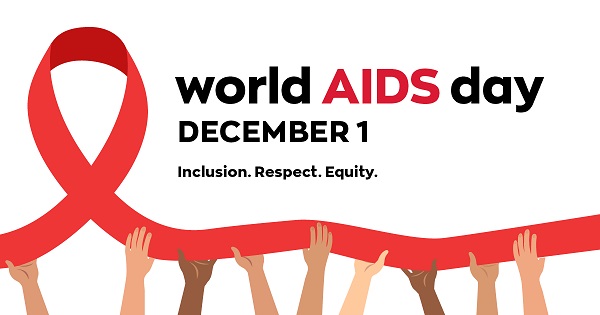World AIDS Day is marked globally on 1 December. In 2023 the national theme for World AIDS Day is Inclusion. Respect. Equity.

In Australia, it is a day for the community to:
Much has changed since HIV was first identified in the mid-1980s. Today in Australia:
Wearing a red ribbon, the international symbol of HIV awareness and support, is one way of showing your support for people living with HIV and honouring lives lost over the past 40 years.
Part of our everyday life as a community is being mindful of our community members living with HIV, of demonstrating our support for them and commemorating those with HIV who have passed away.
HIV is a very important part of our community’s history. In the mid-1980s some adults and children with bleeding disorders acquired HIV from their clotting factor treatment products. Some lost their lives to HIV while others live with HIV today. Treatment product safety is now greatly improved and the risk of bloodborne infection from products derived from blood is extremely low. Nevertheless, the impact of HIV has been profound. It affected not only the people who acquired HIV, but also their partner, family and friends, the health professionals who have cared for them, and the bleeding disorders community generally.
The HIV experience drew on the resilience that was already a strong element among people with bleeding disorders and led to a resolve to respond as a community, taking on effective advocacy around safer treatments and providing support.
This year’s theme is a timely invitation to consider what Inclusion. Respect. Equity. means to us.
We are grateful to some of our community members living with HIV who generously shared their thoughts.
Neil
I’ve been very open about my HIV status for years now and I’ve been humbled by the respect shown to me by everyone I’ve told. Being free to answer questions and break down any fears has only helped my inclusion in social circles.
Mike
When I see the word ‘inclusion’, I think of how the bleeding disorders community and the HTCs have come together to deal with HIV.
Haemophilia when I was growing up in the 1950s, 60s and 70s was life threatening and I required many treatments.
The 1980s was a catastrophic period. HIV caused a lot of devastation and worry to me and my wife personally. It also brought a lot of families together, and it was this support that helped us to survive this period in our lives where so much was unknown.
We were very fortunate to have great team of doctors, nurses and a psychologist who were very understanding and supportive, and we would not have survived this time without the tireless work from HFA.
Anth
For me, this year’s World AIDS Day themes provide a checklist of game-changing ideals in global efforts to a) eliminate HIV transmission, and b) care for people living with HIV. Without a sharp uptick in inclusion, respect and equity, the world’s poorest and least powerful communities will continue to be disproportionately affected.
But what do these words mean to our bleeding disorders community in Australia? Those of us who have lived with HIV for over 40 years, and those of us who have seen loved ones succumb? I often feel like our part in the story of HIV/AIDS gets forgotten. While the increasing dissociation of HIV/AIDS and bleeding disorders creates safety for us, it denies our truths and remarkable achievements too. Whether you mark World AIDS Day privately or publicly, or not at all, please know that you remain part of a community that is extraordinary for its resilience and dignity in the face of bloodborne viruses.
Read 40 years of HIV – where to next? for reflections from our affected community about their experiences and thoughts about the future.
Visit www.worldaidsday.org.au for more information about World AIDS Day in Australia.
Haemophilia Foundation Australia acknowledges the Traditional Owners and Custodians of Country throughout Australia, the land, waters and community where we walk, live, meet and work. We pay our respects to Elders past and present and extend that respect to all Aboriginal and Torres Strait Islander peoples.
Sign up for the latest news, events and our free National Haemophilia magazine